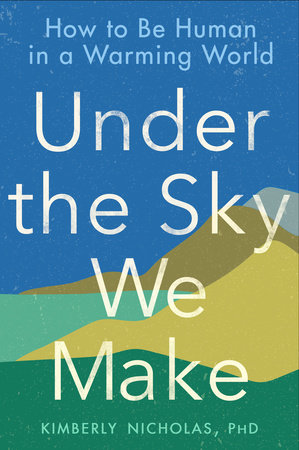rachelmanija (![[personal profile]](https://www.dreamwidth.org/img/silk/identity/user.png) rachelmanija) wrote2024-06-20 11:12 am
rachelmanija) wrote2024-06-20 11:12 am
Under the Sky We Make: How to Be Human in a Warming World, by Kimberly Nicholas

This book is very worthy, which is undoubtedly why it's gotten such good reviews. But good politics do not a good book make. This is yet another book that should have been an article. Let me summarize the book for you:
1. Climate change is caused by humans. It's bad beyond belief. We have approximately ten years to put on the brakes before apocalyptic levels of catastrophe. (The book was written in 2019, so we now have about five years.)
2. Technological solutions to remove carbon from the atmosphere are impossible, will make things worse, and are morally bad because they give us permission to emitting carbon that we know it'll be removed. The only solution is to stop emitting. Completely. Not reduce, go to zero.
3. There are THREE things you need to do to stop producing carbon. They are more important than anything else you can do. Stop fixating on stuff like recycling or planting trees, and focus on these:
3A. Stop flying.
3B. Stop driving.
3C. Stop eating all animal products, especially meat.
There, now you have all the actual information in the book.
Seriously, I hope her intended audience reads it and takes it to heart. But on a personal level, I found it obnoxious. Here's why.
1. Could have been a feature article.
2. It's entirely individualistic. The closest it comes to suggesting larger solutions is to suggest talking to your friends and writing to your representatives.
Why is it so hard for Americans to just stop driving? Yes, yes, we suck. But the other issue is that there are vastly powerful and absurdly wealthy forces which have prevented and continue to prevent any non-car form of transportation from being safe, usable, or even existing in many parts of America. "Stop driving" is literally impossible for many individuals. This is a collective, political problem, not an individual one. New Yorkers are way more likely to not drive than Angelenos. Is it because Angelenos are selfish and bad, and New Yorkers are unselfish and good? No, it's because New York has subways!
Nicholas herself was able to stop driving because she MOVED TO SWEDEN. Now there's an accessible, practical, and easily scalable solution!
Yes, it would be great if every American found some way to stop driving,
For not flying, she gives the example of a friend who stopped attending scientific conferences because he was just flying out there for one hour, presenting a paper, and going home. Great, that saved his personal flights. How about lobbying to make those conferences wholly or partly virtual? That's a collective action that would do a lot more. (Also, her friend group is REALLY not representative of most people - not even most upper-class Americans are in the habit of flying for a one-hour meeting or presentation!)
3. By narrowing down all the possible things a person could do to three and by making them 100% individual consumer choices, it leads climate-concerned people down the path of becoming Chidi Anagonye having a nervous breakdown over whether his almond milk is ethically sourced. If you have more than two eggs per week, you are personally destroying the world!
The eggs are a good example of the absolutism that's more likely to give people a nervous breakdown than to be helpful. I eat more than two eggs per week. I assume those eggs still account for less carbon than the average two eggs, because my eggs come from my own chickens. Obviously keeping backyard chickens are not practical for most people. But what if you ate more eggs because you got them from someone else who keeps backyard chickens? What if you make sure to get them from a small, well-kept, flock from a small farmer? What if you eat more eggs to make up for eating less meat?
These are not issues which are addressed. Two eggs per week or bust!
4. She leaves out important details. For instance, she says coffee and chocolate are particularly carbon-intensive, and we should to eat berries instead of chocolate, and drink tea instead of coffee. Why is coffee worse for the environment than tea? What's so bad about chocolate specifically? Nicholas doesn't say. If you're trying to make people quit coffee and chocolate, you really ought to back it up with results.
5. The author's style is insufferable. (Thanks, peeps! Well, that was a bit heavy, now, wasn't it?! After we've made it through All The Climate Feels... Reader, I am a turkey heiress.) It's like Carrie Bradshaw writing about climate science. She goes by Kimmy, and her friends are named Colty and Puddy. I kept expecting them to say, "Tally-ho good chap, let's toddle off to see the sunset over the Raj."
6. Which brings me to the fact that it is 100% focused on upper-class white Americans. And, yeah, very worthy, it is indeed all largely our fault and we should change. But it's also centering white upper class Americans and the individual things we do individually, which I don't think is the best lens through which to look at the problem.
The next time I pick up a climate book, if the author is a white American, I am going to put it down.